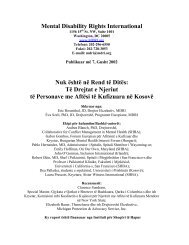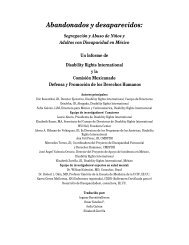Torture not Treatment - Disability Rights International
Torture not Treatment - Disability Rights International
Torture not Treatment - Disability Rights International
You also want an ePaper? Increase the reach of your titles
YUMPU automatically turns print PDFs into web optimized ePapers that Google loves.
TORTURE NOT TREATMENT<br />
National <strong>Disability</strong> <strong>Rights</strong> Network, School is Not Supposed to Hurt: Investigative Report on Abusive Restraint and<br />
Seclusion in Schools (January 2009).<br />
39 G.W. LaVigna and A.M. Connellan, Alternatives To Punishment: Solving Behavior Problems With Non-Aversive<br />
Strategies (1986). See TASH Statement on Positive Behavioral Approaches,<br />
http://www.tash.org/iRR/positive_behavior_supports.html; The Association for Positive Behavior Support<br />
http://www.apbs.org/index.html.<br />
40 NY Psychological Association Task Force (2006), supra <strong>not</strong>e 37, at 1.<br />
41 The New York Psychological Association leaves open the possibility that particular techniques of aversive<br />
intervention may be need if they are “medically necessary to protect the child from serious self-injurious or otherinjurious<br />
behavior.” Id., at 6.<br />
42 The Alliance to Prevent Restraint, Aversive Interventions, and Seclusion (APRAIS) is a coalition of groups whose<br />
mission is “To seek the elimination of the use of seclusion, aversive interventions, and restraint to respond to or<br />
control the behavior of children and youth.” TASH is a member of the Alliance, available at<br />
http://aprais.tash.org/index.htm (last visited April 21, 2010).<br />
43 NY Psychological Association Task Force (2006), supra <strong>not</strong>e 37, at 6.<br />
44 NYSED Review Team (2006), supra <strong>not</strong>e 17, at 16.<br />
45 NY Psychological Association Task Force (2006), supra <strong>not</strong>e 37, at 13.<br />
46 Id. at 11, quoting D. Day, “A review of the literature on restraints and seclusion with children and youth: toward<br />
the development of a perspective in practice” (2000), available at http://rccp.cornell.edu/pdfs/Day.pdf (retrieved<br />
July 26, 2006).<br />
47 Id.<br />
48 Frank L. Bird & James K. Luiselli, “Positive behavioral support of adults with developmental disabilities:<br />
assessment of long-term adjustment and habilitation following restrictive treatment histories,” 31 Journal of<br />
Behavior Therapy and Experimental Psychiatry 5, 7 (2000).<br />
49 Matthew L. Israel, supra <strong>not</strong>e 5, at "there is extensive research and disagreement as to the efficacy of the use of<br />
aversives."<br />
50 Bird & Luiselli (2000), supra <strong>not</strong>e 48, at 18.<br />
51 MDRI Interview (2009).<br />
52 MDRI Interview (2009).<br />
53 NY Psychological Association Task Force (2006), supra <strong>not</strong>e 37, at 3.<br />
54 Id.<br />
48




